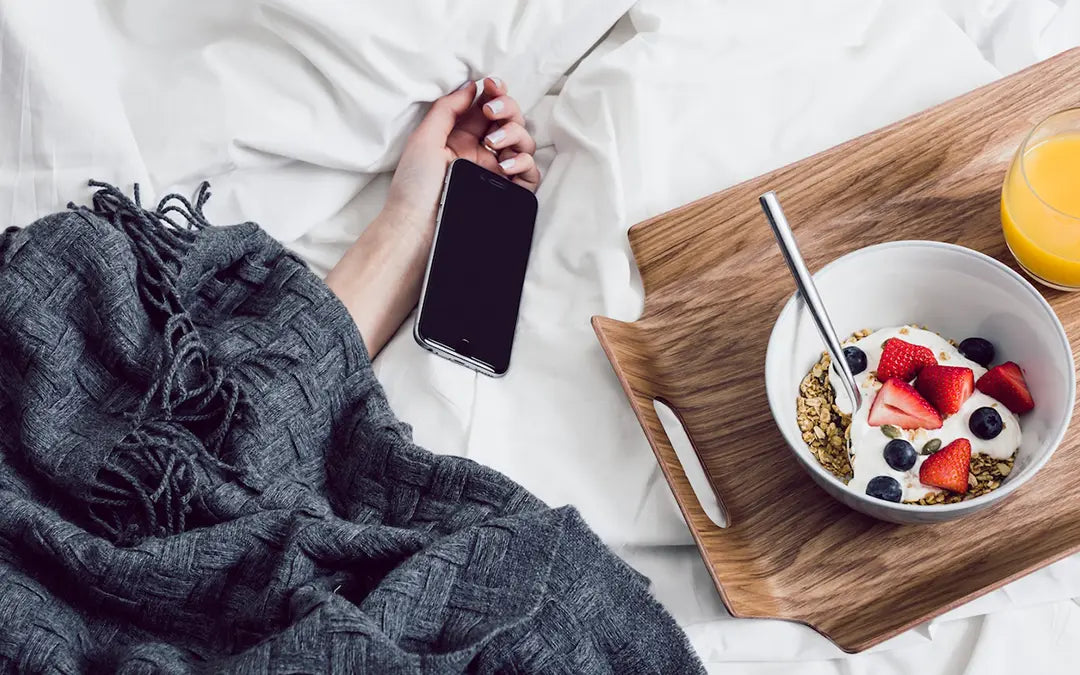
By Mia Rigden Board-certified nutritionist, classically trained chef
What we put in our bodies today contributes to how we will feel and the decisions we’ll make tomorrow. Nutrition influences sleep, which influences energy levels, which influences the nutrition decisions we make and how our bodies metabolize food and process nutrients, which influences our energy levels, which helps determine our quality and quantity of sleep.
It’s a circle that can be vicious or healthful. Poor sleep and low energy not only contribute to feeling tired, it can influence your mental alertness, physical performance, emotional health, hormones, circadian rhythms, food cravings, and more. In my nutrition practice, I’m often inquiring about a client’s sleep and energy patterns before we even start to discuss food. We must examine our sleep patterns and daily energy levels to make sure we’re getting the most out of our foods and supplements.
Sleep and energy
We live in a go-go-go world, but the quiet work your body does in the wee hours of the night sets the stage not just for feeling good in the morning, but for long-term health. There are two parts to our nervous system: the sympathetic, known as “fight or flight,” and the parasympathetic, or “rest and digest.” Sleep is an important time for our parasympathetic nervous system to work its magic, allowing our bodies to relax and conserve energy for all the tasks we’ll need to accomplish the next day while performing critical maintenance functions like cellular repair, tissue growth, and recovery. Adequate sleep isn’t just a measure of time spent in bed. The quality of your sleep counts, too. If you don’t wake up feeling rested and energized, chances are you’re not getting the quality or quantity of sleep you need.
Energy and sleep
In the near-term, feeling well-rested and energetic improves your quality of life and helps you make choices that are more supportive of overall health. It might sound obvious, but when we’re tired we need stimulants to get us through the day; think caffeine and carbohydrates (including sugar). This is biological. Our body knows sugar and carbs will give us a boost of energy. If you struggle with sugary cravings, your energy levels are the first place you should look to improve. Staying motivated with your healthy routines, like exercise and cooking, is more difficult when your energy is low. It’s hard to make decisions for your future self when you have an immediate need to stay alert and get through the day. If you’ve ever skipped a workout or ordered takeout because you were tired, you know what I mean. It can be hard to wind down when you’re pushing through low energy levels and riding the stimulant train all day — even if you’re exhausted. So, we resort to comfort foods, a TV binge, and alcohol at night to help us “relax,” but this really is just setting the stage for another poor night's sleep. And so the cycle perpetuates.
Energy, Sleep, and Nutrition
Since sleep and energy levels are so fundamentally connected, it’s impossible to improve one without addressing the other, so here are some tips to help optimize both, including ways to use nutrition to your benefit:- Balance your blood sugar. Eat blood sugar balancing meals that include adequate protein, healthy fats, and fiber with minimal sugar and carbohydrates. This includes snacks! Every time our blood sugar spikes, our stress hormone cortisol spikes, which is a temporary stimulant usually followed by a crash.
- Establish routines. Eating at regular times during the day and developing a consistent sleep schedule will help to regulate circadian rhythm.
- Avoid excess caffeine and alcohol. Studies show coffee drinkers are not more alert than non coffee drinkers; they’re just addicted to coffee. It’s a hard cycle to break (and you don’t have to be completely caffeine-free), but being more mindful of your relationship to caffeine can help you find your natural energy levels. And alcohol, while it might make you feel sleepy, is detrimental to the quality of your sleep.
- Exercise regularly (but not right before bedtime). Physical activity can help improve your energy levels and the quality of your sleep. Be mindful not to overdo it. More is not always better when it comes to exercise. Rigorous exercise activates the sympathetic nervous system, so if you’re tired or stressed, you might need more restorative exercises that activate the parasympathetic (think yoga, hiking, or simple walks outside).
- Spend time outdoors. If you work in an office, make sure to take regular sunlight breaks. Sunlight suppresses melatonin, which makes us sleepy. This is supposed to happen at night, but if you’re inside all day you might start making melatonin earlier. If you feel an energy low in the afternoon, a 10-minute walk outside could be all the perk up you need.
- Take a magnesium supplement. It’s estimated that over 50% of the population is deficient in this essential mineral, which is crucial for our stress response, nervous system, and relaxation. We need this rest to build our energy stores. Magnesium L-Threonate has been shown to significantly raise magnesium levels in the brain where sleep hormones are produced.
Mia Rigden is a Los Angeles-based board certified nutritionist, trained chef, and the author of The Well Journal (2020) and Foodwise (2023), a comprehensive, encouraging guide to healthy eating with 100 original, nutritionally-balanced and flavor-enriching recipes. Learn more about working with Mia on her website, check out an online course, and follow on Instagram @mia_rigden for science-backed, practical nutrition advice.

